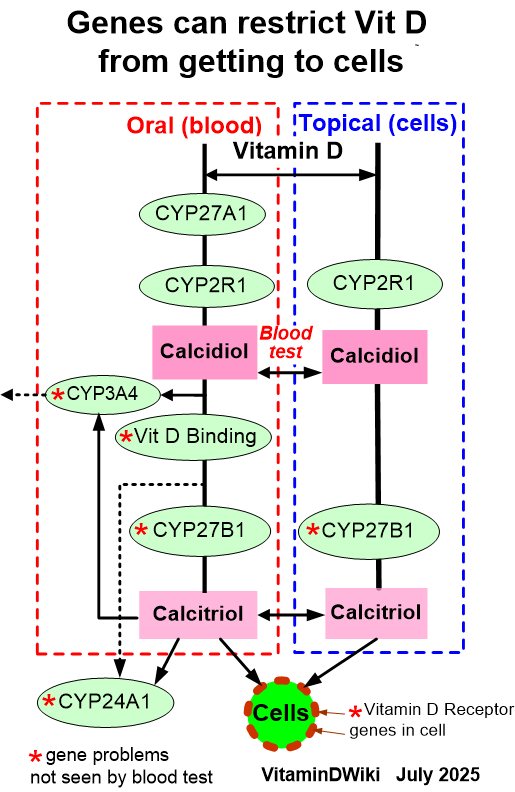Gestational Diabetes Mellitus associated with 4 Vitamin D genes
Variants in Vitamin D Binding Protein Gene Are Associated With Gestational Diabetes Mellitus.
Medicine (Baltimore). 2015 Oct;94(40):e1693. doi: 10.1097/MD.0000000000001693.
Wang Y1, Wang O, Li W, Ma L, Ping F, Chen L, Nie M.
📄 Download the PDF from VitaminDWiki

To investigate whether single nucleotide polymorphisms (SNPs) within 4 representative genes (VDR, GC, CYP2R1, and CYP24A1) encoding the core proteins involved in vitamin D production, degradation, and ligand-dependent signaling pathway are associated with gestational diabetes mellitus (GDM) in a Chinese population. A total of 1494 pregnant Han Chinese women (692 women with GDM and 802 women with normal glucose served as controls) were recruited through a 2-step approach. Participants were further divided into 2 groups according to body mass index before gestation (pre-BMI) (25 kg/m2). Nine SNPs (rs3733359, rs2282679, and rs16847024 in GC, rs2060793 and rs10741657 in CYP2R1, rs2248359 and rs6013897 in CYP24A1, rs11574143 and rs739837 in VDR) were genotyped using TaqMan allelic discrimination assays. The relationships between genotypes/alleles of a single locus as well as haplotypes of each gene and GDM were analyzed. We did not observe a significant difference in genotype frequency of each SNP between cases and controls.
However, in the obese subgroup (pre-BMI ≥ 25 kg/m2), the risk allele-A of rs3733359 showed an association with increased risk of GDM (OR = 1.739 , 95% CI = 1.066-2.837, P = 0.027). The GG-haplotype frequency of rs3733359 and rs2282679 in GC was modestly lower in the GDM group (OR = 0.848, 95% CI = 0.719-0.999, P = 0.048). Rs2060793 and rs10741657 were associated with insulin area under the curve (P = 0.028, P = 0.042, respectively), while rs739837 and rs6013897 demonstrated a correlation with fasting glucose (P = 0.019, P = 0.049, respectively). Additionally, rs2248359 displayed an association with leukocyte counts (B = 0.063 P = 0.033) and rs16847024 was related to high-sensitivity C-reactive protein levels (B = 0.086, P = 0.005).
Our results indicate an association between GC variants and GDM, as well as a relation between a subset of loci in CYP2R1, CYP24A1, and VDR and clinical parameters related to GDM. Our findings may provide information for identifying biomarkers for early risk prediction of GDM and the pathways involved in disease progression.
PMID: 26448018 PMCID: PMC4616752 DOI: 10.1097/MD.0000000000001693
